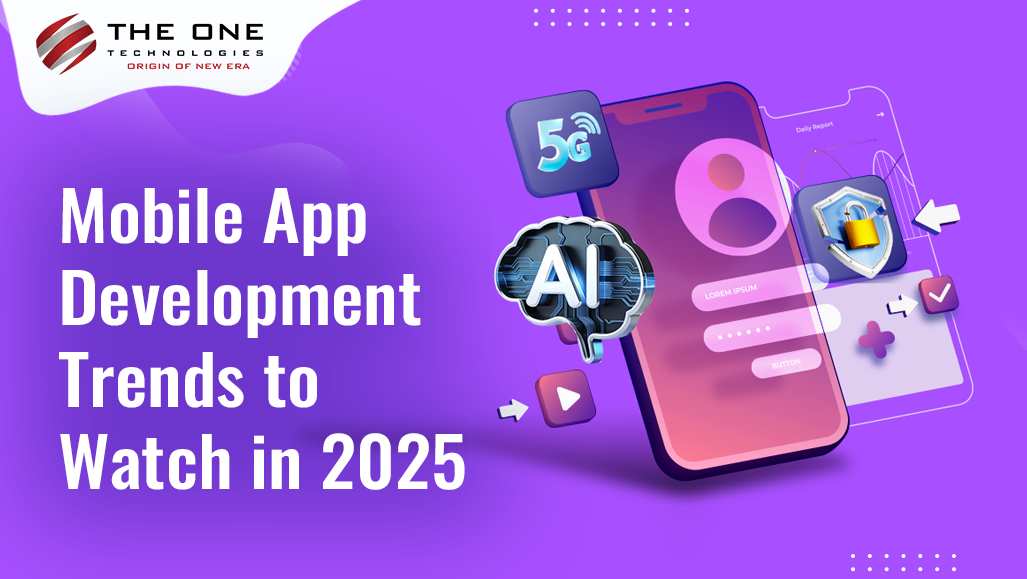Mobile App Development Trends to Watch in 2026

Making a mobile app is like building a skyscraper on sand. What you create today needs to handle new tech, people changing how they use apps, and lots of competition. An app that can't keep pace isn't just outdated, it's a sunk cost that painfully damages your brand. The actual test for decision-makers is to move from a project-oriented mindset to a platform orientation, investing in an adaptable solution for the future, not merely for the present. This is precisely why choosing the right mobile app development company that understands this long-term vision is a critical strategic decision.
In order to future-proof your company, it's essential to know where mobile technology is going. Let's dive into the best mobile app development trends of 2026 that all professionals and business leaders should have on their watchlist.
1. AI-Powered Personalization at Scale
Artificial Intelligence (AI) is no longer a buzzword, it's the backbone of apps now. Personalization based on AI will be the rule for mobile experiences in 2025. From product recommendations to learning paths that are user-adaptive. Companies are employing AI to forecast user needs in real-time.
Why it matters: Personalization drives higher engagement and loyalty. Apps that can learn from user actions can offer products. Services or content are delivered accurately, increasing satisfaction.
Business takeaway: Implementing AI doesn't have to mean reinventing the wheel. Start out by using AI-based APIs for features like chatbots, voice recognition, or predictive analytics.
2. Super Apps and the All-in-One Experience
The Asia-based "super apps" have inspired companies worldwide. No longer do consumers want to switch between several apps. Instead of using one ecosystem to pay, shop, socialize, and get services. In 2025, anticipate more companies shifting towards building or entering such ecosystems.
Why it matters: Consumers love ease. One app that minimizes friction and aggregates services will beat fragmented ones.
Business takeaway: Can't create a full-fledged super app? Think strategically. Could you add more complementary services to your app? Or could you acquire or partner with an existing ecosystem to become larger?
3. Security and Data Privacy
As more people use their phones, there are proportionally more security threats. With stricter and stricter laws, like GDPR, CCPA, and India's DPDP Act, companies simply can't afford to lose user trust. Apps in 2025 will rely more and more on biometric login. Zero-trust security architectures and decentralized data storage.
Why it matters: A single breach can damage brand reputation and result in significant compliance penalties.
Business takeaway: Feature security, don't add it as an afterthought. Emphasize your app's privacy-first orientation in marketing, it's becoming a differentiator.
4. Low-Code and No-Code Development
Demand for apps is outpacing the supply of experienced developers. Enter low-code/no-code platforms. These are empowering non-tech teams with the ability to build and deliver successful apps in a flash. By 2025, such platforms will become mainstream, bridging business demands and IT capabilities.
Why it matters: Faster development cycles = faster go-to-market strategies. Organizations can iterate, test, and scale with fewer dependencies on bulking developer teams.
Business takeaway: While low-code products won't replace advanced builds? They're excellent for MVPs, in-house applications, or prototypes. They should be considered by decision-makers as part of a hybrid development plan.
5. 5G-Driven App Innovation
With 5G networks widely available, mobile apps are able to leverage ultra-low latency and light-speeds. This creates opportunities for immersive AR/VR applications. Real-time gaming and remote collaboration solutions that were bandwidth-constrained previously.
Why it matters: 5G alters user expectations. Apps that are slow or seem to lack capability will quickly fall behind.
Business takeaway: Think about revamping how your app feels to use. Could faster info speeds open the door for cool stuff like virtual demos of what you sell? Customer help built right into the app, or streaming videos in crazy-good quality?
6. Voice-First Interfaces
Voice search and voice commands are going beyond virtual assistants like Alexa and Siri. In 2025, expected that apps will become infused with natural language processing (NLP). In order to give users hands-free, easy-to-use interactions.
Why it matters: Voice interfaces enable apps to be more convenient. Inclusive and accessible, especially where the literacy level in a market is diverse.
Business takeaway: Think about where voice could add value to your app, ordering, navigation, or even internal employee apps. It can be an effort-light, high-impact feature.
7. AR, VR, and the Metaverse Shift
While the metaverse bubble may have burst, AR and VR continue to advance in actual applications. From e-commerce try-ons to immersive employee training. More apps will incorporate these technologies in 2025. To create interactive user experiences.
Why it matters: Immersive technology can make your app stand out in crowded markets. Novelty is no longer the goal, now it's about utility.
Business takeaway: Begin small. Even AR product previews in-store or VR learning modules for corporate training can have a quantifiable effect.
8. Sustainable and Inclusive App Development
Consumers these days, especially young people, appreciate companies that are sustainable and inclusive. In mobile apps, this translates to energy-efficient code. Dark mode for less battery use, and an accessible design for differently-abled consumers.
Why it matters: Socially responsible Companies enjoy greater customer loyalty and brand value.
Business takeaway: Adopt sustainable design and ensure your app is accessible. Introducing small changes can make your app reach a wider audience.
The Conclusion
The pace of innovation for mobile applications is blinding, yet also full of opportunity. The winners in 2026 won't necessarily be the ones with the largest budgets, but those that can stay agile, embrace new tech strategically, and keep user experience top of mind. This is where choosing the right Mobile App Development services becomes a critical strategic advantage.
Being a business leader, the question is not "Should we adopt these trends?" but "Which ones are optimal for our business goals, customers, and future vision?" By being conscientious and forward-thinking in what you invest in now, you can make your mobile presence relevant and necessary over the next few years.









